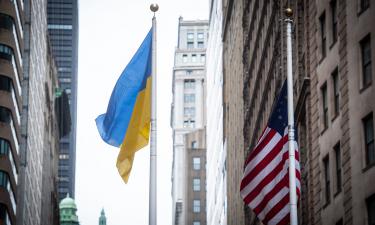Dmitry Linvinovich: War at threshold
Clouds are gathering over Iraq, and this seems to be serious. The Middle East is at the threshold of a new war. This Tuesday, American and British aircraft again delivered missile strikes on military targets in south of Iraq. According to a Pentagon official, this was a reciprocal measure to Bagdad’s threat to prevent the flight of aircraft patrolling “no-fly zone.”
Such attacks have become usual long ago, though this time, the question is about a more large-scale operation of the US and Great Britain: about 3,000 US military men joined the military training carried out in Kuwait, not far from Iraqi border. Nobody would have paid much attention to this if not for an event that happened practically at the same time. Today, Kuwait sent to the UN Security Council a protest against a provocation committed by Iraq on the emirate’s border. Kuwait demanded to make “the Iraqi government stop border violations and to respect Kuwait’s territorial integrity and sovereignty." The document also states that the recent incidents “prove Iraq’s intention to destabilize the situation on the border to escalate tension in the region.” The situation is really not very usual: this morning, US President George Bush demanded that Bagdad admit UN inspectors onto its territory to observe Iraqi's military program. Otherwise, George Bush explained, Saddam Hussian would “soon understand with what it is frought for him.” Countries creating weapons of mass destruction could be targets of the US in its war on terrorism, he added.
Afghanistan seems to be only a start. If creates weapons of mass destruction with which he wants to terrorize the whole world, he will be brought to account. Therefore, Kuwait’s activities fully correspond with US plans. As a matter of fact, this is a direct invitation for the US to intervene and to punish the aggressor; all the more Washington has been for a long time searching for a reason to deliver a mass bomb strike against Iraq.
During recent months, Hussain has been carrying out active diplomatic work with Arab countries and has made a progress. Today, in Oman’s capital city of Muscat, a meeting of the foreign ministers of six member countries of Arab Gulf Co-operation Council (GCC) is opening. Heads of foreign offices of Saudi Arabia, United Arab Emirates, Kuwait, Oman, Quatar, and Bahrain will discuss 30 questions on the agenda, which are divided into two groups: questions of foreign policy, to which situation around Afghanistan belongs; relations with Iraq and Iran, and the situation in the Middle East; and issues of co-operation’s development in the framework of GCC. It is expected that the ministers will express their irreconcilable position on US administration’s probable plans to spread the anti-terrorist campaign to Iraq and Yemen.
Yesterday, Bagdad made a step to secure Russia’s protection: on the Russian-Iraqi economical forum in Moscow, authoritative representatives of Bagdad assured Russians that the Russian Federation took priority-driven positions in oil and gas complex of Iraq. Now, the only task of the Russians is to keep them. To this statement, Russian deputy foreign minister Alexandr Saltanov explained that Iraq took an important place among foreign policy priorities of Russia, so everything connected with this country draws its leadership’s rapt attention. Moscow’s position is very careful. It hardly will openly support Iraq at the moment. A quarrel with Washington does not fit into Moscow’s plans, though it is not intending to drift. Dmitry Litvinovich PRAVDA.Ru
Read the original in Russian: http://www.pravda.ru/main/2001/11/28/34281.html
Subscribe to Pravda.Ru Telegram channel, Facebook, RSS!





